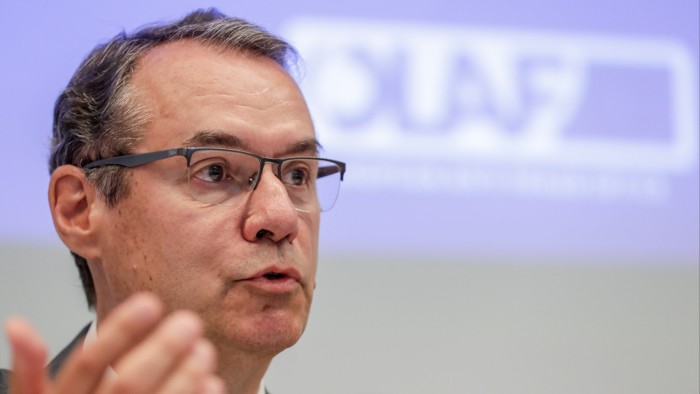This article is an on-site version of our Europe Express newsletter. Premium subscribers can sign up here to receive the newsletter every weekday and Saturday morning. Standard subscribers can upgrade to Premium here, or view all FT newsletters
Good morning. French Prime Minister Michel Barnier was sacked last night as the far-right teamed up with the left-wing bloc in the National Assembly, plunging the EU’s second-largest economy into an even deeper political quagmire. Amid this, top EU officials will travel to South America to finalize the Mercosur trade deal that France has long opposed.
Today the head of the EU’s anti-fraud agency tells Laura and our colleague that he still does not have the access he needs to investigate the European Parliament, and our Berlin correspondent reports on a disturbing collision between a German military helicopter and a Russian warship in the Baltic Sea.
Under the carpet
Two years after the Qatargate corruption scandal in the European Parliament, the EU’s anti-fraud agency is still struggling to gain access to the institution to conduct investigations. to write Alice Hancock And Laura Dubois.
Context: Qatargate resulted in several Members of the European Parliament being accused of accepting cash from Qatari and Moroccan officials in exchange for political favors in parliament. Due to limitations on its jurisdiction, Olaf, the bloc’s anti-fraud watchdog, has been locked out of MEPs’ offices and laptops since long before the scandal. The investigation was led by Belgian authorities.
At the end of last month, parliament signed an agreement with the European Public Prosecutor’s Office to improve cooperation in investigations.
But Olaf is still waiting for such a deal. The agency’s oversight committee last month declared that there was no legal reason why Olaf was denied greater access to investigate MEPs.
“Parliament appeared to be of the opinion that the entity best placed to investigate such allegations is not Olaf, but Parliament itself, and that Olaf should accordingly refrain from any parallel investigation,” the committee wrote in a report.
Olaf’s investigative capabilities should extend to “all members of the Commission, Parliament, the Court of Justice, the Court of Auditors, the European Central Bank, the European Ombudsman and the European Investment Bank,” it added, if constitute “a serious breach” of a public servant’s duties “which could lead to disciplinary or criminal prosecution”.
Ville Itälä, director general of Olaf and himself a former member of the European Parliament, said the stalemate made Olaf’s job “much more difficult”.
“Our mandate includes all institutions. However, the European Parliament believes that we do not have the power to visit the offices of MEPs and search their laptops and phones,” Itälä told the FT.
That was despite a 1999 agreement, he added, which stated that “the European Parliament’s security office will assist [Olaf] in the practical conduct of research”.
Olaf’s work typically involves investigating any allegations of corruption or unethical behavior and then reporting cases to EPPO if evidence of abuse is found.
A parliament spokesperson said that when it comes to investigations into Members of the European Parliament, it is “cooperating fully with Olaf, in full compliance with the applicable legal framework”.
Chart du jour: Fierce competition
Danish energy company Ørsted was hailed as a pioneer when it moved from fossil fuel operations to become a leader in offshore wind power, but supply chain disruptions and competition from China threaten to blow the company off course.
Close shave
There is more tension in the Baltic Sea, this time over an incident between a Russian tanker and a German military helicopter, which some in Berlin see as yet another example of Moscow’s hybrid warfare. writes Laura Pitel.
Context: NATO capitals are on high alert after months of Russia-linked hybrid attacks, such as arson or unattributed explosions, that officials say are designed to test Western resolve without provoking a military response .
The tanker, which was accompanied by a Russian warship, was approached by a Bundeswehr helicopter on a reconnaissance mission, a person briefed on the events said.
Instead of using their radios to warn the German planes to keep their distance, the tanker or warship crew fired one or more flares – the kind of flares normally used to indicate maritime distress.
German Foreign Minister Annalena Baerbock briefly alluded to the incident, which took place in late November earlier this week.
She said the incident was one of many examples of how Russian President Vladimir Putin was “expanding his hybrid attacks on peace in Europe,” also citing GPS jamming and the recent cutting of undersea communications cables.
She said that in response, NATO would intensify its monitoring in the Baltic Sea.
The person briefed on the helicopter incident, which was first reported by German news agency DPA, played down its seriousness and argued there was “no immediate danger to anyone.”
But they added: “This is not the way such meetings should take place.”
What to watch today
-
Malta is hosting the OSCE ministerial meeting, attended by Russian Foreign Minister Sergei Lavrov and US Secretary of State Antony Blinken, among others.
-
Luxembourg Prime Minister Luc Frieden speaks during the meeting FT global boardroom event, at 11 a.m.
-
President of the European Parliament Roberta Metsola visits Poland and meets Prime Minister Donald Tusk.
Read this now
Do you enjoy Europe Express? Sign up here to have it delivered straight to your inbox every weekday at 7am CET and on Saturdays at 12pm CET. Tell us what you think, we’d love to hear from you: [email protected]. Stay up to date with the latest European stories @FT Europe
This article has been corrected to reflect that Olaf was not involved in the Qatargate investigation.

